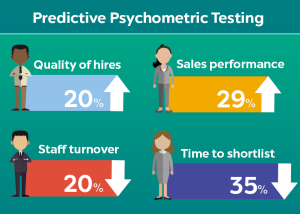A psychometric test commonly refers to a series of numerical, verbal and logical reasoning tests and a personality questionnaire which is used to measure a candidate’s mental skill and behavioural style.
While it can confirm whether a candidate is as smart as they say they are, it can also predict their likely future performance in a particular workplace.
Now an affordable option
According to Katrina Bolovan, a Principal Consultant at Davidson HR Consulting, testing used to be prohibitively expensive.
“Psychometric assessments were traditionally completed via pen and pencil with a Psychologist interpreting the results”, she explains. These days, with the help of sophisticated technology, the process is automated and, as a result, much more affordable.
What are predictive psychometric assessments and how do they work?
In a nutshell, psychometric assessments take big data then drill down into it to scientifically predict a candidate’s suitability to a role.
Like many professions, there is now more data available to HR professionals than ever before (i.e. via core HR systems, surveys, employee engagement data and external data from sources such as LinkedIn and Facebook). Predictive psychometric assessments make decisions based on the analysis of very specific and significant cross sections of real-world performance data, ensuring only information pertinent to a particular role is assessed.
Once the candidate has completed the assessment, the responses are then compared to a body of results, factored against ‘norm groups’ in that specific job’s field. The accuracy of such tests has been tested and validated by leading performance management companies, such as Deloitte.
“Predictive analytics use a combination of different types of information to predict future performance in a role, team or organisation.
Essentially, data is collected, cleansed, patterns are identified and predictions are made using those patterns,” Bolovan explains.
Davidson has formulated a range of predictive psychometric tests, available through CVCheck, to suit everyone from executives to blue-collar trade workers. Tests can be adapted to specific roles. A test for an accountant, for example, would naturally look at proficiency with numbers and a high attention to detail, says Bolovan.
Questions in the assessments are tailored to be very job specific and are designed to measure competencies identified as important to the role. Questions relating to each quality are asked several times in different ways, and candidates are given a score based on their answers.
The tests tell you whether your candidate has the cognitive ability for doing the job and whether their work styles and preferences match up to the position both now and in the future.
“Our range of predictive assessments have already been proven (on the job) to predict job performance, whether that be safety, sales, leadership success, engagement or retention, to name a few.
When a recruiter is using our range of assessments they can be confident in knowing that they are identifying the most suited candidates for their roles,” Bolovan adds.

The proof is in the statistics
Still not sold on the benefits of psychometric assessments? According to data collected by HR consulting firm Davidson, companies who have used psychometric testing during the hiring process experience the following advantages:
- Reduced time to short-list by 35%
- Increased sales performance by 29%
- Reduced safety incidents of new hires by 51%
- Improved quality of hires by over 20%
- Reduced assessment costs by 52%
- Decreased turnover by more than 20%
Valuable for any role
Bolovan believes psychometric testing can be valuable for any role and is best used early in the recruiting process.
“Testing your short list is a far more effective method then just testing your top two candidates.
Our range of assessments allow for rank ordering of candidates in terms of job suitability, and ensure that you’re taking to interview, or final interview, candidates that are going to be suited to the role.”
Another reason Bolovan recommends psychometric testing, is that it’s completely objective.
“Our assessments don’t differentiate between gender or age. They are completely free of unconscious bias,” she says.
One piece of the hiring puzzle
Face-to-face interviews will always be an essential part of any hiring process, as will referee checks, but Bolovan believes psychometric testing can offer a deeper understanding of every candidate.
“In a face-to-face interview, you see what the candidate wants you to see,” Bolovan says.
“Psychometric testing really looks at underlying motivations, preferences and abilities. These tests help you to see the bottom of the iceberg – why and how an individual may behave in certain circumstances.
“We can look at how driven they are, how analytical they are, how reliable they are, and if how they may behave on the job, for example.”
Of course, humans are complex and test results should be interpreted sensitively.
“Just because you may have a strong preference to work autonomously, doesn’t mean you can’t work well in a team,” Bolovan points out, adding that by using predictive psychometric tests you’re arming yourself with information that’s difficult to extract through traditional hiring processes.
“Psychometric testing is not a silver bullet, but it does provide very valuable information that is hard to obtain with other recruitment methods.”




